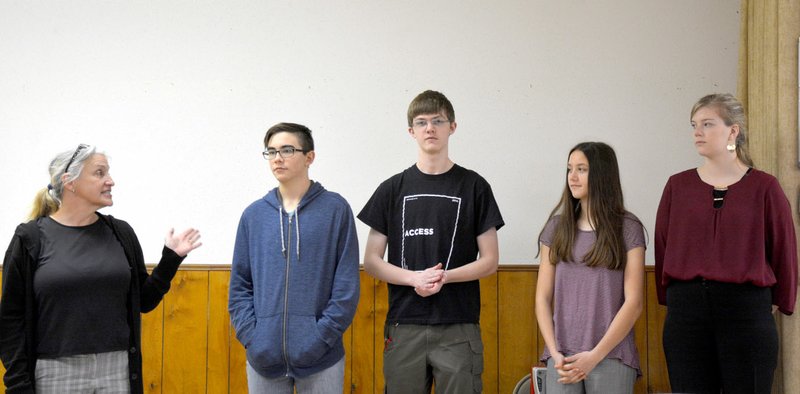SILOAM SPRINGS -- Homeschooled students showcased what they learned over the past year at a Classical Conversations Siloam Springs event Feb. 11 at Eastgate Church of Christ.
At the annual Excellence in Education event, students from each of Classical Conversations programs -- foundations for students age 4 through 12, essentials for students age 9 through 12, and challenge for students age 12 and up -- demonstrated what they have learned throughout the year.
Classical Conversations Siloam Springs is a homeschool group where about 50 children and parents meet on Tuesday for a school lesson and then go home and study the subjects they learned in greater detail. The group is part of Classical Conversations, a national home-centered classical education movement, according to the organization's website classicalconversations.com.
Classical education can trace its roots to ancient Greece and was the method of education with which the apostle Paul would have been instructed, according to Amanda Kentner, support representative for Siloam Springs. Classical education teaches through memorization. Children as young as four are given facts to memorize and are drilled on them in the foundations program, Kentner said. As the children get older they apply those facts by asking questions and delving deeper into the "why" of those facts in essentials, Kentner said. When the children reach the challenge program, they have been working with the facts so long they are able to explain them to someone else, Kentner said.
The three programs in Classical Conversations each represent a stage in a child's education and are patterned after the classical education model of grammar, dialectic and rhetoric, according to Miriam Gage, Foundations and Essentials director.
The students start at the grammar stage and focus on memorization, Gage said. Students will then move on to the dialectic stage where they have more of an understanding in applying their knowledge, finally they advance to the rhetoric stage where they gain more wisdom and learn to express themselves.
"Foundations is the memorization that gets applied when they are in essentials and challenge," Gage said.
Once a year, all Classical Conversations groups around the nation hold an excellence in education event.
"For our community, it's usually in February," Gage said.
The event last week opened with the foundations and essentials classes singing a part of the timeline song which began at creation and ended at the birth of Jesus. This was followed by Gage speaking about how Classical Conversations educates through the classical education method which relies on memorization and layering of information.
Then the foundations and essentials classes, consisting of children ages 4 through 12, sang what they learned about English, history and Latin. Next, the challenge classes, which have students ages 12 and up, demonstrated their knowledge of subjects like literature, math and science.
Foundations is presented in three cycles, Gage said. Each cycle lasts the 24 weeks the class is in session, she said. After the third cycle, the class will start with the first cycle again, so the kids will go through each cycle twice, Gage said.
Students don't have to start at the first cycle because they will have a chance to learn that cycle when it repeats, Gage said.
For her family, Gage said her children enjoy learning since she started with Classical Conversations. Gage said she would love for families who are in public education or homeschooling to see what Classical Conversations is all about.
Anyone wanting more information may visit the Classical Conversations website, search for their community and contact the support specialist to find out when an information meeting will be held, Kentner said. Information meetings are held by a director of one of the three programs and give prospective homeschooling parents information on what they can expect from the program, Kentner said. After the meeting, the parents visit an open house and talk to the director of the program they wish to enroll their child in to start the process, Kentner said.
"We'd love for other families to come and join us," Gage said.
NW News on 02/23/2020

